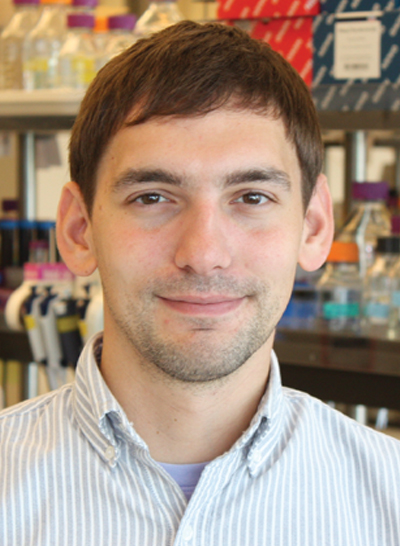Postdoc wins Tabor award for lipid membrane research
Lipid membranes surround and protect each of our cells. They serve as a first line of defense, allow for intracellular signaling and keep subcellular compartments separate. The lipid composition must therefore be diverse and distinctive enough to keep a cell running smoothly. Figuring out which lipids are needed where and when can be challenging, however. , a postdoctoral fellow at the University of California, Berkeley, studies lipid properties and why certain ones belong in specific cell membranes. For his research, Budin received a 2017 .
 Itay Budin is a Miller Institute junior fellow at the University of California, Berkeley, and works at the Joint BioEnergy Institute. courtesy of Itay Budin
Itay Budin is a Miller Institute junior fellow at the University of California, Berkeley, and works at the Joint BioEnergy Institute. courtesy of Itay Budin
Budin investigates how lipid composition affects membrane properties and the consequences of altering particular lipids in model organisms. Lipids make up cellular and subcellular membranes and help maintain integrity and compartmentalization. However, manipulation of these lipids to understand their roles has been done primarily in vitro, and tools to recapitulate findings within living organisms are difficult to develop. Budin uses metabolic engineering to explore lipid composition and functionality. He explained that he does this by altering the genes that give rise to particular lipids. He is then able to “rewire” these pathways within the organism to understand which lipids are necessary for a particular membrane and why. Budin and colleagues have learned that a cell’s membrane can act as an environmental sensor, and a particular set of proteins then responds to maintain homeostasis. was published in May 2017 in the journal Metabolic Engineering.
JBC Associate Editor presented the award to Budin in August at the . Receiving the award was a “great honor and real thrill,” Budin said, and receiving it from Voelker, a lipid biologist, reinforced the importance of his work. The award committee thought Budin’s work was instrumental in “assigning a crucial mechanistic role for unsaturated lipids in serving as molecular signals that liberate transcription factors from the endoplasmic reticulum in response to a variety of stimuli,” they wrote with input from Voelker.
Budin earned his Ph.D. in biochemistry and physical biology from Harvard University in the laboratory of investigating the changes in lipid composition throughout evolution. He then came to the University of California, Berkeley, on a Miller Institute Junior Fellowship. He works with at the , a research center in Berkeley focused on synthetic biology and metabolic engineering.
Enjoy reading 91—«…´¥´√Ω Today?
Become a member to receive the print edition four times a year and the digital edition monthly.
Learn moreGet the latest from 91—«…´¥´√Ω Today
Enter your email address, and we’ll send you a weekly email with recent articles, interviews and more.
Latest in People
People highlights or most popular articles

Hidden strengths of an autistic scientist
Navigating the world of scientific research as an autistic scientist comes with unique challenges —microaggressions, communication hurdles and the constant pressure to conform to social norms, postbaccalaureate student Taylor Stolberg writes.

Richard Silverman to speak at 91—«…´¥´√Ω 2025
Richard Silverman and Melissa Moore are the featured speakers at the 91—«…´¥´√Ω annual meeting to be held April 12-15 in Chicago.

Women’s History Month: Educating and inspiring generations
Through early classroom experiences, undergraduate education and advanced research training, women leaders are shaping a more inclusive and supportive scientific community.

91—«…´¥´√Ω honors Lawrence Tabak with public service award
He will deliver prerecorded remarks at the 2025 91—«…´¥´√Ω Annual Meeting in Chicago.

91—«…´¥´√Ω names 2025 JBC/Tabor Award winners
The six awardees are first authors of outstanding papers published in 2024 in the Journal of Biological Chemistry.

Daniel N. Hebert (1962–2024)
Daniel Hebert’s colleagues remember the passionate glycobiologistscientist, caring mentor and kind friend.

